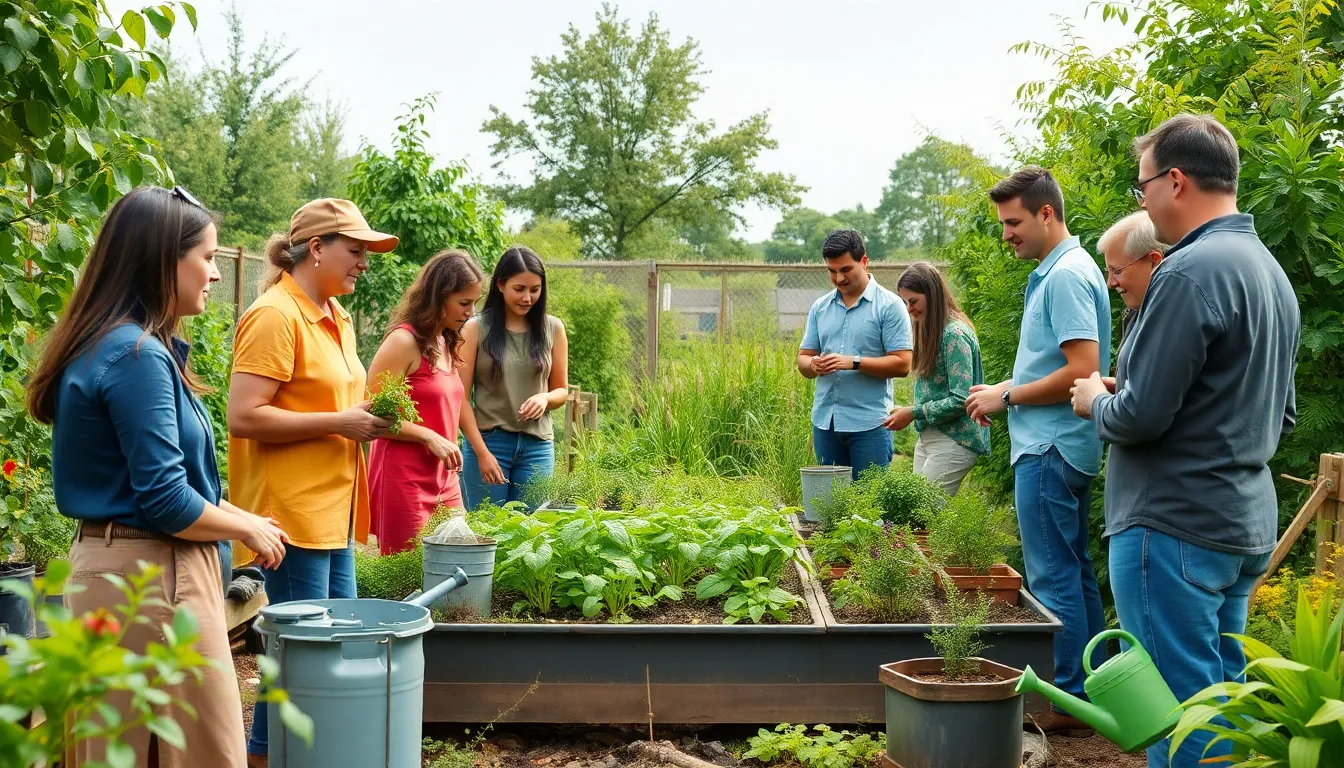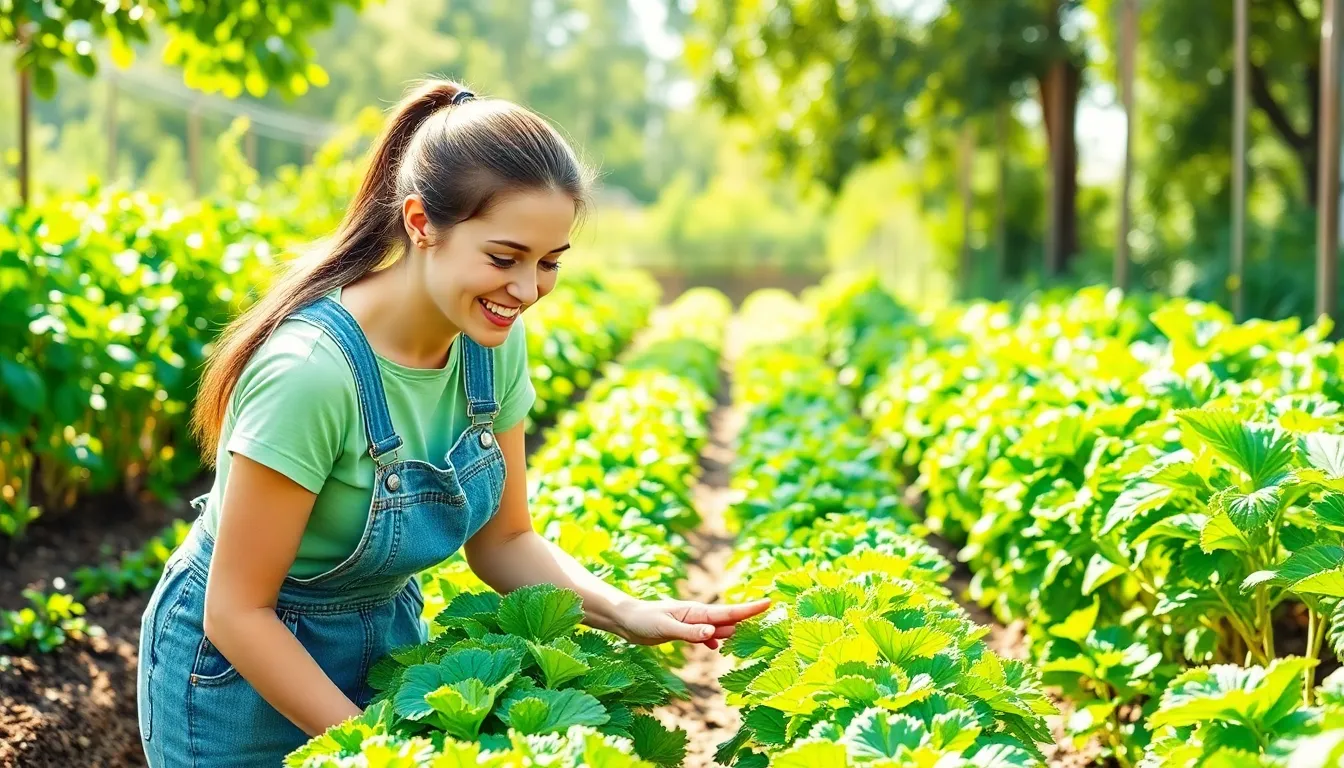In a world where plastic straws are the new villains and eco-warriors are the heroes, sustainable living books are like the trusty sidekicks every green crusader needs. They’re packed with tips, tricks, and a sprinkle of humor to help anyone transform their life from wasteful to wonderful. Who knew saving the planet could be this fun?
These books don’t just preach; they inspire action. Whether it’s growing your own veggies or mastering the art of upcycling, they make sustainable living feel like an achievable adventure instead of a daunting chore. So grab a cup of organic tea, kick back, and dive into the pages that could change your life—and the planet—for the better.
Table of Contents
ToggleUnderstanding Sustainable Living
Sustainable living encompasses practices that protect the environment while enhancing personal well-being. Individuals who embrace this lifestyle make conscious choices that conserve resources and minimize waste.
What Is Sustainable Living?
Sustainable living refers to reducing one’s environmental impact by adopting eco-friendly habits. Cultivating a garden for fresh produce, using energy-efficient appliances, and practicing minimalism all contribute to this lifestyle. These actions promote a balance between personal needs and environmental health. Sustainability emphasizes regeneration and conservation of natural resources. Choices in transportation, food consumption, and waste management play a critical role in this approach to living.
Importance of Sustainable Living
Living sustainably fosters a healthier planet for current and future generations. Environmental degradation results from overconsumption and waste, leading to climate change and biodiversity loss. Sustainable practices help mitigate these issues by conserving resources and reducing carbon footprints. Economic benefits arise through energy savings and reliance on local products. Communities thrive when individuals prioritize sustainable choices, promoting a collective effort towards a greener future. Educating oneself about sustainable living amplifies its impact and encourages others to join the movement.
Top Sustainable Living Books

Sustainable living books serve as valuable guides for individuals interested in eco-friendly practices. They offer insights ranging from gardening techniques to energy conservation, making sustainability approachable for everyone.
Must-Read Titles for Beginners
“Zero Waste Home” by Bea Johnson introduces readers to the principles of reducing waste through practical tips. “The Complete Book of Herbs” by Lesley Bremness emphasizes growing herbs, which enriches meals and promotes self-sufficiency. “Braiding Sweetgrass” by Robin Wall Kimmerer blends indigenous wisdom and scientific knowledge, highlighting the importance of reciprocity with nature. “The More We Get Together” by Matt Smith focuses on community initiatives that inspire cooperative living. Lastly, “The Green Book” by Elizabeth Rogers provides simple strategies for making everyday choices more sustainable.
Advanced Reads for Sustainability Experts
“Drawdown” edited by Paul Hawken presents solutions to reverse climate change through expert contributions. “The Ecology of Commerce” by Paul Hawken explores the intersection of business and sustainable practices, offering transformative ideas for corporate leaders. “This Changes Everything” by Naomi Klein challenges economic and political systems by advocating for environmental policy reform. “Biomimicry” by Janine Benyus showcases nature-inspired designs that can solve modern challenges. “The Uninhabitable Earth” by David Wallace-Wells discusses urgent climate realities, motivating effective responses to impending crises.
Themes Explored in Sustainable Living Books
Sustainable living books explore various themes essential for cultivating an eco-conscious lifestyle. Readers discover practical solutions for everyday sustainability challenges.
Eco-Friendly Practices
Eco-friendly practices form a cornerstone of sustainable living literature. Tips often include gardening, composting, and using natural cleaning products. Authors emphasize energy-efficient appliances for reducing carbon footprints. Strategies for reducing single-use plastics frequently appear in these guides. Many books provide step-by-step instructions for upcycling household items to prolong their life. Engaging narratives illustrate how simple changes can lead to significant environmental benefits.
Minimalism and Decluttering
Minimalism and decluttering promote intentional living by reducing excess. Writers frequently stress the importance of clearing physical clutter to foster mental clarity. This theme encourages readers to assess possessions critically, keeping only what adds value. Sustainable living books link minimalism with environmental responsibility, since fewer items mean less production waste. Readers find practical tips for donating unneeded items or recycling materials. Ultimately, embracing minimalism helps create a more focused and fulfilling life.
Sustainable Food Choices
Sustainable food choices represent another vital theme in these books. Authors highlight the benefits of local and seasonal eating for supporting community agriculture. Recipes often emphasize plant-based ingredients, showcasing their environmental advantages. Many books educate readers about organic farming and the importance of avoiding harmful pesticides. Tips for meal planning and reducing food waste are commonly shared. By making conscious choices, readers can support their health while positively impacting the planet.
How to Choose the Right Sustainable Living Book
Selecting a sustainable living book involves a few key considerations that align with personal interests and expertise of authors. Focus on these elements to find the most suitable resource.
Consider Your Interests
Interests play a crucial role in book selection. Identify which aspects of sustainable living resonate most, whether gardening, minimalism, or eco-friendly practices. Exploring different themes can guide choices. For instance, a reader fascinated by gardening might prefer “The Complete Book of Herbs” for its practical advice. Conversely, those drawn to minimalism may find inspiration in “The More We Get Together.” Allocating time to explore various subjects helps pinpoint a book that aligns with individual passions, making the journey towards sustainable living more enjoyable.
Evaluate the Author’s Expertise
Author expertise contributes significantly to the credibility of a book. Research the backgrounds of potential authors to ensure they possess a solid understanding of sustainable living. For example, Bea Johnson’s extensive experience in zero waste living provides valuable insights in “Zero Waste Home.” In contrast, Naomi Klein’s profound knowledge as a journalist supplies critical perspectives in “This Changes Everything.” Examining an author’s qualifications, published works, and personal experiences fosters trust in the information provided, leading to a more enriching reading experience.
Sustainable living books serve as invaluable guides for anyone eager to embrace eco-friendly practices. They transform the journey toward sustainability into an enjoyable and fulfilling experience. By providing practical tips and relatable insights, these books empower individuals to make meaningful changes in their lives and positively impact the environment.
As readers explore various titles, they’ll discover that sustainable living isn’t just a trend but a necessary lifestyle shift. The knowledge gained from these resources can inspire communities to unite for a greener future. With each page turned, the potential for personal growth and environmental stewardship expands, making sustainable living an achievable goal for all.



